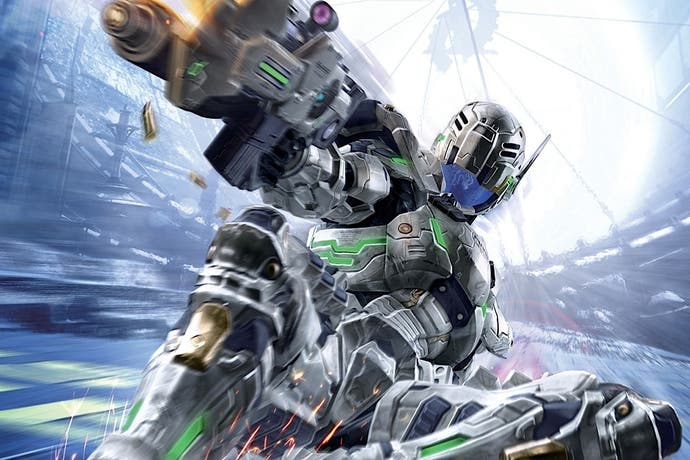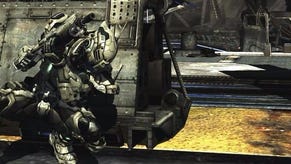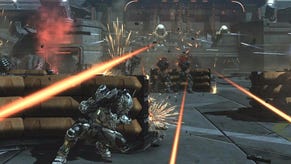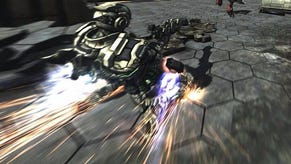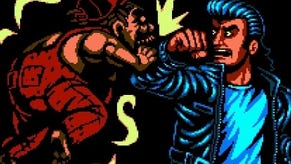Vanquish retrospective
Total ARS.
"To vanquish without peril is to triumph without glory." Had 17th-century French playwright Pierre Corneille not suffered the misfortune of being born 400 or so years before Vanquish was released, I'm fairly sure he would have admired Shinji Mikami's excellent third-person shooter. Indeed, there's an echo of Corneille's words in the Mikami-directed remake of Resident Evil on GameCube: the more challenging difficulty setting, Mountain Climbing, points out that "beyond the hardships lies accomplishment". It's a maxim that has served one of the medium's best game designers well over his storied career, and particularly so here.
There's plenty of glory in your triumphs in Vanquish, because it consistently ensures you're in peril. Enemies are powerful, aggressive and often much larger than you. You're rarely more than a few seconds away from a hail of bullets, or worse, a hail of missiles arcing through the sky towards you. When you crouch behind scenery in other third-person shooters, it's often to reload, or to briefly recover your health. Here you're hunkering down to get the hell out of the way, and often that's still not enough. Hiding behind waist-high walls is not the way to play Vanquish.
But then the encouragement to move into the open and face the onslaught head-on is there from the start. The Augmented Reaction Suit isn't just an incredibly cool piece of Japanese design; it's also responsible for one of the best risk-reward mechanics I've ever seen. It runs off an energy supply that begins depleting immediately upon squeezing L2 (there's something about the DualShock's squishy triggers that makes Vanquish feel gloriously right on PS3) and allows you to pull off a rocket-powered slide that feels amazing. It's a cross between a Ridge Racer car mid-drift and a five-year-old at a wedding reception skidding across the dancefloor on their knees.
Because you can get around much quicker - and because at times your cover is obliterated by a volley of rockets - you're inspired to switch your position more often, and this in turn gives Vanquish a very different rhythm from its peers. It's not about stopping and popping; you'll occasionally rattle off a few rounds from one place, but then you're immediately gliding and roll-hopping somewhere else, changing your angle of attack. But chipping away from range isn't always going to cut it: you'll want to get a little closer to the action. And so Vanquish allows you to briefly slow time while you're using the suit, and it's here where things get a little more dangerous.
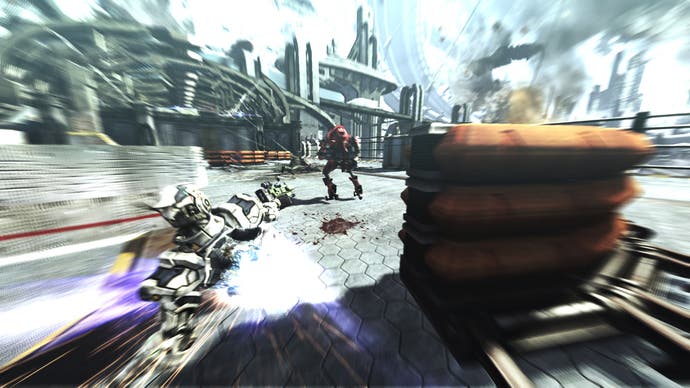
Not that it seems that way when you're bending time to dodge bullets or lining up a shotgun blast to the groin of a towering mech as you glide between its legs. Or, for that matter, when you slide towards an enemy and dropkick it backwards, somersaulting away as your foot pushes back from its steel breastplate. Slowing time such a joy that you want to be able to do it for longer and more frequently than you can - indeed, I'd still love to have had an unlimited gauge as a post-game treat for the ultimate in empowerment.
But Mikami knows better. With each move draining the suit's energy meter - while melee attacks see it overheat almost instantly - it can leave you horribly exposed and vulnerable. The idea, then, is to launch a powerful, precise assault that allows you a brief window of recovery before you move onto the next battle, and the next. It's like swordfighting with guns, if that makes sense - the thrust, the retreat - and that gives the game its unique rhythm, that shifting tempo which instantly distinguishes Vanquish from every shooter that came before, and every one released since.
That Vanquish's arsenal invites you to experiment with different approaches does it no harm, either. Toss an EMP grenade into a group of enemies and you can watch them jerk and twitch as you roll into range, firing energy discs to slice off limbs and heads. The shotgun may be useless at anything but very close range, but you can easily use it to pull off a slide-by shooting. With its chapters split into easily digestible chunks, you can easily replay a section using an entirely new strategy, the abundance of weapon crates allowing you to switch your ordnance with little hassle.
This depth is Vanquish's long-term payoff, but there are plenty of immediate rewards, too. The game regularly offers moments of astonishing spectacle, blistering set-pieces and boss fights so gloriously unrestrained that it even gets away with a cavalier use of quick-time events. As you repeatedly pummel the face of a robot the size of a house you'll briefly wonder why the game didn't sell millions.
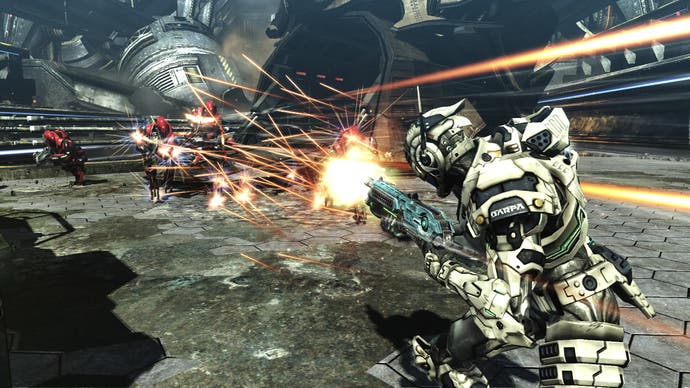
Yet, as the action subsides, you'll know exactly why. It's an uncomfortable thought, but as many are likely put off by the developer's name on the box as are encouraged by it. Platinum's games are self-consciously hardcore, rewarding the initiated while seeming oblique and overly demanding to newcomers. Those who played it exactly like a bog-standard cover shooter can't really be blamed, having been trained to do so by the genre rather than the game. While this is a rare Platinum title with an adequate tutorial, it still leaves plenty unsaid. It might tell you what the buttons do, but it doesn't really tell you how to play it.
Vanquish's short campaign and lack of multiplayer were also sticking points - though how a competitive shooter could work when players can manipulate time is beyond me - but Vanquish's other big problem wasn't really its own doing. It arrived at a time when the market was becoming saturated with third-person shooters, and many took it to be a Japanese attempt to capture the zeitgeist; some critics were even moved to call it a Gears of War clone.
As such, people took its story at face value when its tongue was firmly wedged in its cheek. In the comically gruff, hipflask-swigging Colonel Burns ("thank God I'm an atheist"), it had a parody of video game marines so dead-on that several people missed the joke, assuming this was a Japanese attempt at mimicking the tropes of its western peers. Yet there are several clues that Vanquish is not taking itself entirely seriously. Before the first mission, for example, Burns bellows ,"Come on, you apes! You wanna live forever?" - a line stolen verbatim from Paul Verhoeven's sci-fi satire Starship Troopers.
Vanquish hardly resulted in a commercial victory for publisher Sega, and Mikami parted ways with Platinum once the game had been released. Yet beyond those hardships lay one of the director's finest accomplishments: Mikami had braved the peril of taking on the west at its own game, and triumphantly reclaimed the third-person shooter in the process. In short, Vanquish vanquished.
